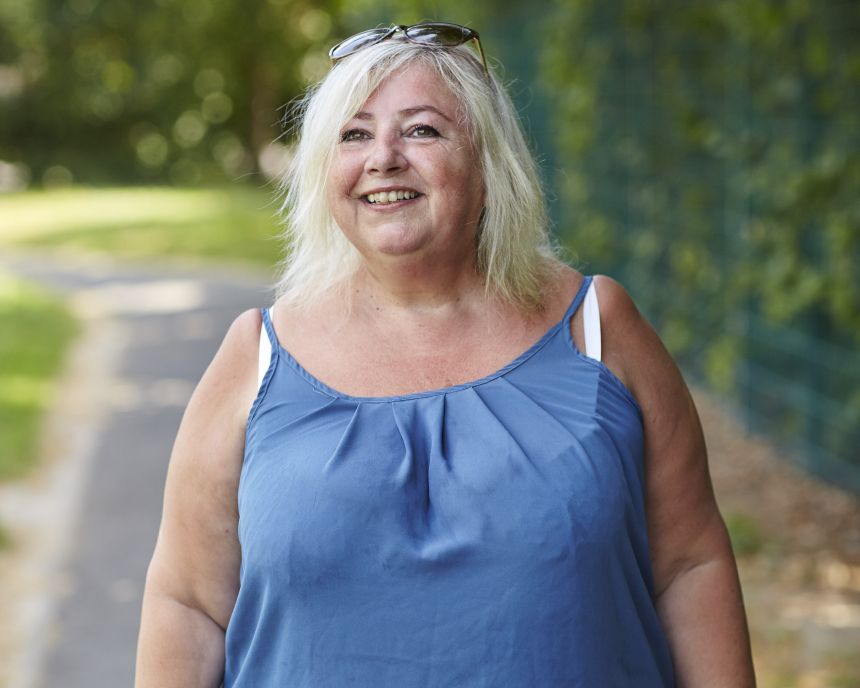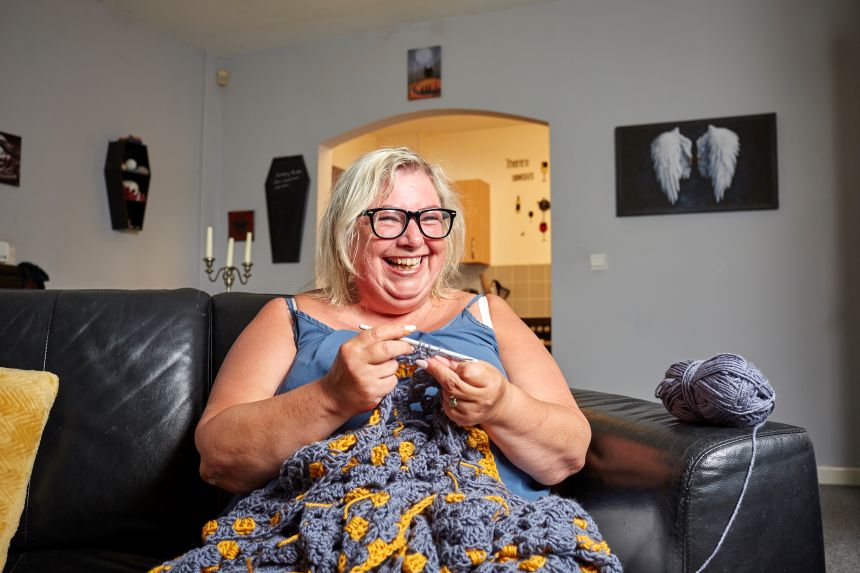Real stories
"I was told I was too young to have dementia"
Anita Goundry lives in Durham and was diagnosed with mixed dementia aged 50. She shares her experience and how her symptoms were initially misdiagnosed.
Anita, a lifelong Durham resident, started her working life at Tyneside market, eventually going on to work in accounts turning struggling pubs into profitable businesses.
‘I only lost one pub in 15 years! I really enjoyed that work,’ Anita says.
It was whilst working there that Anita completed her degree in social work.
‘I qualified and began working with children and families, then adults and eventually with re-homing ex-offenders, which was quite challenging.’
Forgetting names and faces
Anita started to experience health problems around 2012, including a stroke.
Strokes are serious brain injuries that can have lasting effects on memory and thinking, as well as movement and coordination. Having a stroke in your early 40s is unusual, but it can happen.
‘I knew something was wrong,’ Anita says. ‘I rode motorbikes but noticed my balance wasn't right. I couldn’t remember where I was going or where I’d been.
I was missing chunks of life experience. I met somebody in the town, and I was their bridesmaid. But I couldn’t remember who they were. I didn't remember the wedding, and I couldn't remember that I was a bridesmaid.
‘This is what got me started with seeing the GP and trying to understand what was happening.’

“Too young to have dementia”
Initially, Anita was told she was experiencing menopause symptoms.
‘I kept being told I was “too young for dementia” despite saying I had memory issues too,’ Anita says.
‘It was put down to menopause, psychosis, hysteria and hypochondria.'
Anita also cared for her mother, who had dementia at the same time as the menopause.
‘I had this knowledge myself through experience, but doctors weren’t taking any notice of it,’ Anita says.
It can be difficult to tell the difference between the symptoms of menopause and the early stages of dementia. The key differences are that the ‘brain fog’ caused by menopause tends to fluctuate a lot from day to day and generally gets better with treatment and time. Dementia symptoms, on the other hand, are more consistent and steadily get worse over time, over months and years.
Menopause symptoms are very common, whereas young-onset dementia is rare for someone in their 40s. In general, doctors tend to go with a more common diagnosis, unless there’s a good reason not to.
Getting a dementia diagnosis took years
It took Anita around seven years to receive a dementia diagnosis, and looking back, she wishes things were different.
Anita says, ‘In 2018, I was so fed up with my own doctors, I called the memory clinic myself and explained my situation.
‘I was then diagnosed with mixed dementia of Alzheimer's disease, vascular dementia and posterior cortical atrophy (PCA) in 2020.'
PCA is a rarer type of dementia that causes problems with vision.
No diagnosis meant I had to give up work early
While Anita was waiting for a dementia diagnosis, she was studying to become a fully qualified social worker. But because she didn’t know what was causing her symptoms, she had to leave her job. If she’d received a timely diagnosis, her employer would have been able to make reasonable adjustments that allowed her to keep working for as long as she was able to.
‘If I had gotten an earlier diagnosis, I would have still worked, changed jobs,’ Anita says, ‘but I retired which had huge financial implications.
‘So many people who can contribute financially to this country are being thrown on the scrap heap because they can’t get a diagnosis.’
Difficult diagnosis experience
Anita believes that healthcare professionals need to be more aware of young-onset dementia.
I needed somebody to have a look at my memory and to have a look at what I was seeing, hearing and feeling. Not a cold clinical “What is she coming in with now?”.
‘I had one 20-minute session where they talked about my life expectancy. I was told what I had, a brief explanation of what was going to happen to me, given a 'Do Not Resuscitate' form and a pack on Lasting Power of Attorney.
‘You don’t want to hear about the diagnosis like that – you want somebody to explain it to you in a compassionate way.’

Early diagnosis is key
Now more than ten years on from her initial dementia symptoms, Anita says she’s still able to enjoy life.
‘When I look back, there are a lot of things that were wrong,’ she says, ‘But many years down the line I’m still enjoying life.’
Anita volunteers her time with Alzheimer’s Society and has taken some practical steps too – organising a care plan and Lasting Power of Attorney.
‘Helping others is important to me,’ Anita says, ‘bringing awareness to the difficulties younger people face when diagnosed – and keeping busy and trying to stay independent.
‘If I was diagnosed earlier, I wouldn't have lost as much as I did. So, timely diagnosis is important.’
The dementia symptoms checklist
Our dementia symptoms checklist is a helpful tool to make a note of any symptoms before you talk to your GP. It can be completed online or printed out to take with you to appointments.

